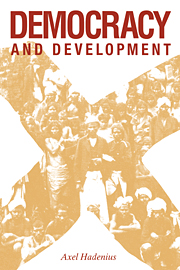Book contents
- Frontmatter
- Contents
- List of tables and figure
- Acknowledgements
- INTRODUCTION
- PART ONE DETERMINING THE LEVEL OF DEMOCRACY
- PART TWO EXPLAINING THE LEVEL OF DEMOCRACY
- 4 Introduction
- 5 Socio-economic conditions
- 6 Demographic and cultural conditions
- 7 Institutional conditions
- 8 General picture and problems of causality
- Appendices
- Notes
- Bibliography
- Index
4 - Introduction
Published online by Cambridge University Press: 28 October 2009
- Frontmatter
- Contents
- List of tables and figure
- Acknowledgements
- INTRODUCTION
- PART ONE DETERMINING THE LEVEL OF DEMOCRACY
- PART TWO EXPLAINING THE LEVEL OF DEMOCRACY
- 4 Introduction
- 5 Socio-economic conditions
- 6 Demographic and cultural conditions
- 7 Institutional conditions
- 8 General picture and problems of causality
- Appendices
- Notes
- Bibliography
- Index
Summary
In this section we shall explore a number of theories on the requisites of democracy. These are grouped into three categories, each of which is the subject of a chapter: socio-economic conditions (Chapt. 5), demographic and cultural conditions (Chapt. 6) and institutional conditions (Chapt. 7). It should be remarked that this is a somewhat rough division; naturally it is impossible to draw hard and fast lines between the various explanations. This division merely attempts to elucidate what in each theory constitutes the principal problem as far as democracy is concerned, that is, where a change (if such is possible) should preferably occur if democracy is to be promoted.
The layout is throughout such that I first present the general statements of the respective theory, its basic tenets and empirical assertions. The aim here is to offer, according to my ability, the best possible interpretation of the ideas in question, which means that I sometimes also ‘stretch’ the theory with further arguments which seem to fit the picture and strengthen its position. Then follows an empirical examination based on the index of the level of democracy which was presented earlier. The objective is to test the extent to which the emergent differences between the countries in terms of democratic performances can be explained by the theories and related hypotheses which are discussed.
The inquiry employs statistical procedures, chiefly by application of regression analyses. For each type of explanation which is subjected to scrutiny a test is first made in the form of a simple (bivariate) regression.
Information
- Type
- Chapter
- Information
- Democracy and Development , pp. 75 - 76Publisher: Cambridge University PressPrint publication year: 1992
